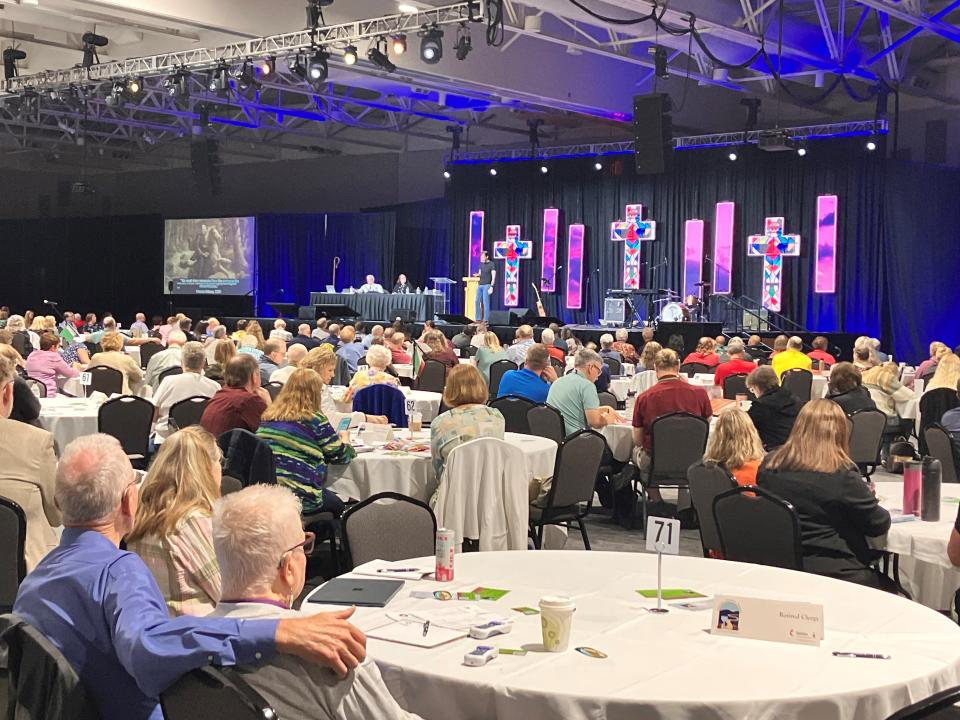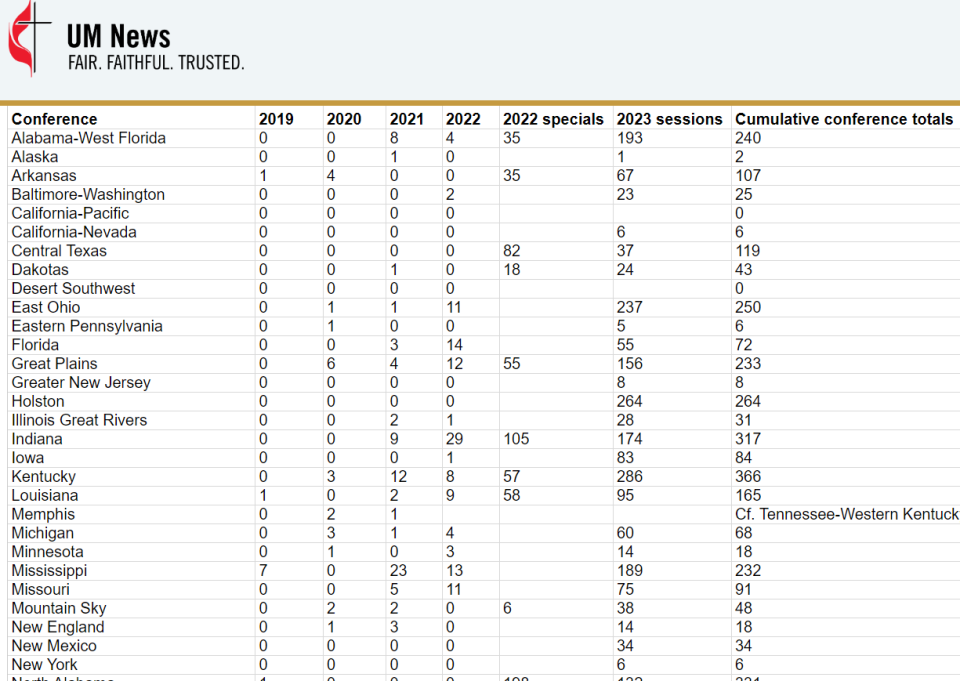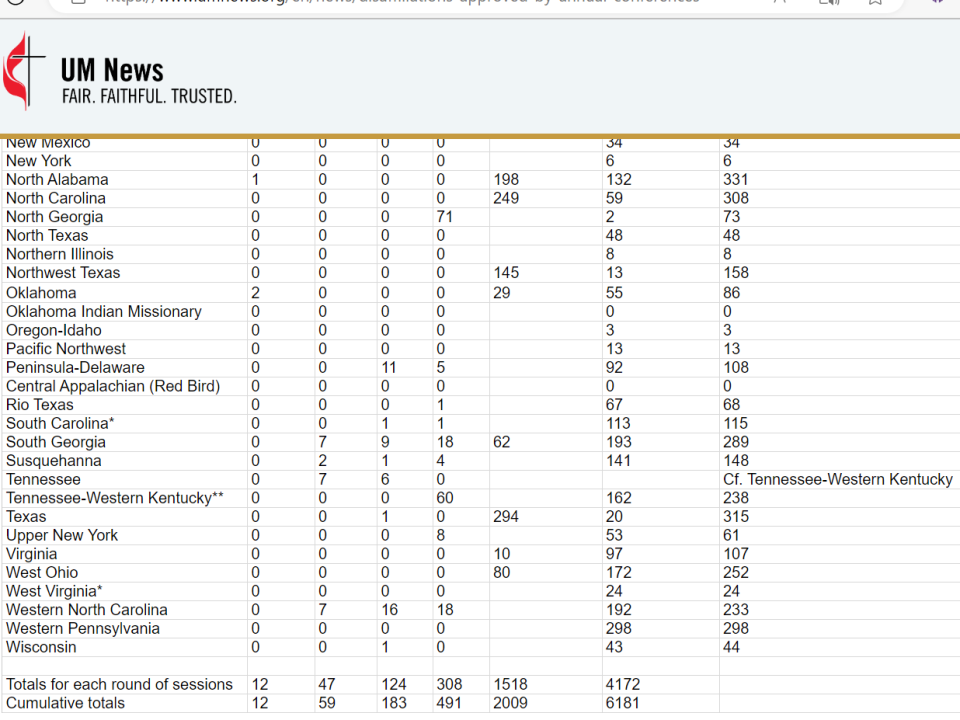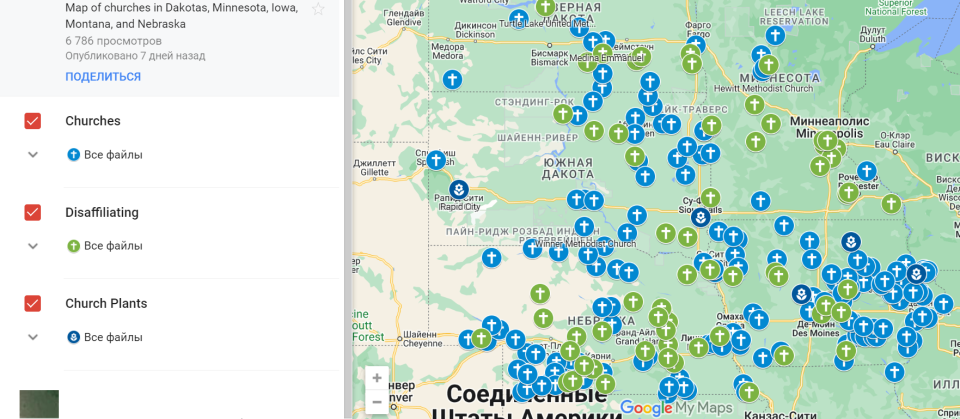The United Methodist Church split in the Dakotas could be about more than LGBTQ+ rights
The ongoing divide of the United Methodist Church, which used to be the second largest protestant denomination in the U.S. after Southern Baptist Convention, might be a sign of broader societal changes that now seem to have touched even the Dakotas, an area usually seemingly covered from the temporal adjustments.
While some of the UMC members tend to downplay the transformation as being related to a single issue of LGBTQ+ rights, their own published works reveal that polemics is broader than minorities question and is related to the church theology as a whole -- one developed since the 18th century that helped shape America today.
“The UMC has been deeply divided on very big questions,” said Chief Financial Officer/ Treasurer for the Global Methodist denomination, launched a little more than a year ago on, Jeff Pospisil adding that the churches were not able to fundamentally agree on what they “believe or what the mission of” the “church should be, and that’s been the case for many years.”
What happened in the Dakota Annual Conference?
With the Dakota Annual Conference ratifying the disaffiliation of 24 congregations in June this year, in addition to 18 congregations that disaffiliated last fall at the Special Session and one that disaffiliated in 2021, the total number of congregations that have disaffiliated from UMC in the Dakotas now amount to 43.
Director of Communications for the Dakotas Conference UMC Doreen Gosmire said given that some of the disaffiliated congregations in Dakotas are smaller in terms of the worshiping communities, the number of people leaving the UMC in the two states will be about 2,500, with membership of the Dakotas Annual Conference amounting to about 30,000 people.
More: 24 South Dakota churches to split from United Methodist Church in rift over LGBTQ+ rights
Fifteen more disaffiliations were ratified at Dakotas Annual Conference Special Session this week. Most of the disaffiliating congregations will go to the Global Methodist Denomination.
Divide exists on the place of LGBTQ+ in the church, clergy
“Currently, the only basis or rationale that disaffiliation can occur is because of the theological differences related to sexual orientation,” Gosmire said.
Although it seems to be factually correct, it is not exactly reflective of the processes happening in the denomination.
The current UMC Book of Discipline maintains clergy cannot belong to the LGBTQ+ community and same-sex marriages are not allowed within the UMC.
The denomination allegedly imposes sanctions for breaking those rules. However, the sanctions are rarely if at all enacted, and the UMC currently includes openly gay clergy and bishops.
“The disciplinary measures for those pastors exist, but they have been thrown away,” Rev. Adam Coalter said.

However, LTBTQ+ people are welcomed to the church communities as individuals. Rev. Ret. Roger Spahr, former superintendent for the Southeast District of the Dakotas Conference, said he did not know any UMC pastors that were “kicking anybody out of” the church based on sexual orientation.
“We never held people really accountable with the United Methodist denomination to hold to those traditional Christian beliefs,” Pospisil said.
With all that, part of the clergy wanted to go even further in support of same-sex marriages and gay ordination.
Rev. Scott McKirdy, who is not planning on leaving the UMC, said accepting same-sex marriages and gay clergy ordination was not a problem for him because he did not believe that God created something that was wrong.
“I hope our denomination and our church will be more inclusive of people cause that’s how I read the Gospel – it’s more inclusive than our policy currently is,” said Rev. Peter Kip Roozen, also not planning on disaffiliating.
For some, however, the fact that de facto reality changed and moved farther away from the rules was a problem, as both theological conservatives and theological liberals confirmed. The issue stretched beyond sexuality to overall Bible interpretation.
Progressive vs. conservative theology
“I am one of the progressive voices,” McKirdy said. “There are some of us that read it much more literally and conservatively, and there are some of us that read it with a more progressive interpretation – that has been absolutely part of the issue that we wrestle with.”
More: How a SuFu Creative toy drive is helping children play well with others
John Lomperis, UM General Conference delegate and the director of an advocacy group urging the leaders of UMC to return to the original doctrine, UM Action was more precise about “what we wrestle with.”
He maintained that the key dividing issues between the “traditionalist” (or theologically conservative) and “progressive” (or theologically liberal – not to be confused with politically conservative and liberal) factions are different beliefs about the authority of the Bible and doctrines about Jesus Christ, in addition to social issues like abortion and sexual morality.
“We had a bishop in Colorado stating that Jesus Christ was bigoted and prejudiced and he needed to grow closer to God,” said Pospisil. “For us that doesn’t align with what we have written down as what we believe.”
Rev. Adam Hamilton, who was asked by the White House to deliver the sermon at the Obama inaugural prayer service, wrote the book “Making Sense of the Bible” that along with the chapter “Homosexuality and the Bible” also includes his point of view on how to interpret the Bible.
His opinion at a larger scale is reflective of a traditional historic approach that states that the Bible was written by humans and proliferates the general beliefs of its time.
“For us that’s a deviation from what we originally believe that the whole Bible is inspired by God and it’s God’s truth,” said Pospisil.
He said that earlier surveys conducted by UMC prior to separation were also indicative of the ongoing estrangement. It became evident, said Pospisil, that part of the church wanted to focus on social justice while other parts wanted to focus on social justice, evangelizing, and “seeing people saved.”
That fragmentation, he maintained stemmed from the fact that the denomination turned out to split on a fundamental faith issue – whether all people are fallen and the need a savior or all people are good, and thus the main task of the church is not to save the fallen people, but to reform the society, so that the good could manifest itself.
How the Global Methodist Church will address LGBTQ+ issues
LGBTQ+ population is still welcomed into the Global Methodist Church and are not required to be celibate to participate in church life. However, to move to leadership positions, they are expected to confine with faith requirements and remain celibate.
“All people are welcome, and LGBTQ+ – no less than others, but if somebody wants to move to leadership, there are certain behavior expectations, the expectations of behavior and belief,” Lomperis said.
More: Newly-elected bishop will visit Sioux Falls' United Methodist churches this weekend
How the divide happened
The same-sex marriages and gay clergy provision was incorporated in the book of discipline in 1972.
Since then, it was reviewed by the church at its every General Conference remaining intact even at the special session of the General Conference in 2019 that voted for the so-called Traditional Plan for the UMC denomination with 53.28% against 47.72% conservative majority.
“It kind of closed the loophole,” said Lomperis. “Saying you were not supposed to violate the ban, and now if you violate the ban, there’s going to be consequences.”
The same 2019 General Conference passed the “exit plan” also known as paragraph 2553 that allows the congregations wishing to leave UMC "for reasons of conscience" regarding issues of human sexuality, according to the UMC official website, do so until the end of 2023.
The general expectation at that time was that it would be the liberal minority that would leave.
However, as "The Washington Post” reported, despite the results of the vote, progressive UMC pledged to disregard the results of the vote and decided to stay within the church.
Lomperis said because of liberal majority in the church bureaucracy especially in the North Central jurisdiction that includes the Dakota Conference, the conservatives were later bullied and eventually decided to disaffiliate instead.
In 2020, a mixed group of progressive and conservative Methodists with a professional mediator came up with another plan for disaffiliation known as a Protocol of Reconciliation and Grace Through Separation.
Why separation became a struggle
“That was supposed to be a nice clean way of just ending the fight because it seemed like despite our best efforts we couldn’t get along, and we were going to keep fighting each other every four years,” said Pospisil.
Disaffiliating according to the Protocol included:
Sharing denomination assets as approximately (but not equal for both parties); “That’s a very small percentage,” said UMC Bishop Thomas Bickerton referring to the percentage of the UMC liquid assets the Global Methodist Movement should have received under protocol.
Conservatives give up the name of the church;
Conferences could choose to staying liberal or conservative;
Leave or stay vote by simple majority;
No financial penalties for leaving except annual dues.
Disaffiliating according to the 2553 included:
Disaffiliating by 2/3 majority vote;
Exit penalties that included all current dues; all next year dues; legal fees to transit congregations’ titles; a fee supposed to cover pensions for retirees. Some conferences, also required to pay from 10% to 50% of the congregations’ real estate property value, Lomperis said.
“Imagine if you buy a house, and you and your spouse have 30 years to pay off your mortgage, it’s a big sacrifice,” Lomperis said. “You finally paid it all off, and then whatever it took you, your 30 years to pay for your house, all of a sudden somebody tells you, 'Hey, just to keep your house you have to pay for 50% of what it took you 30 years to pay off, and if you don’t pay that within the next three months, I’m going to take your house away from you.'”
Protocol discussions got conservatives into the mindset of accepting that they would leave and start their own denomination, said Lomperis. But once that mindset took hold, the protocol discussions were postponed allegedly because of the COVID-19 pandemic.
The conservatives pointed out that in 2023 larger public events were already happening and cited their willingness to work on vaccination plans for all the delegates, however, the protocol was not enacted, and the conservatives started to leave by paragraph 2553 rules.
“Liberal groups including the liberal groups who claim to support the protocol – they refused to help African delegates, and then conservative groups, including my own group, we did raise money to help African delegates go get their vaccines,” Lomperis said.
He added liberal groups then said that should not have happened. Bickerton said he was aware of the offer made by the Global Methodist Church, but it was determined that even with that offer the UMC was unable to make sure that conference would be held with integrity.
More: How some South Dakota churches are adapting to attendance declines
For the Dakotas, however, given each conference is allowed to determine their own particular rules for disaffiliation, it worked out fairly well, according to Gosmire.
She said the Dakotas Annual Conference decided that it would be fair to allow the leaving congregations to take their properties for a nominal payment of $1. However, they require the leaving congregations to pay their dues for the following year too.
“It is something that always is expected that you will pay for a current year and a year beyond,” Gosmire said. “Part of this is to allow the transition to happen with a lot of different things – it might be your staff, your clergy, could be, because we obligate our budget a year ahead.”
The results of the split
Gosmire said the disaffiliations is a time of sadness when people who used to be in the same faith community would not be there together anymore. Nationwide, Pospisil estimated, between 17% to 22% of the congregations will end up disaffiliating from the UMC.


In Dakotas, its 43 congregations leaving the UMC also account for a little less than one-fifth of the initial number of congregations in the region. The number that can still grow in August. Gosmire estimated that 15 more congregations might disaffiliate in August.
The majority of the churches disaffiliating from the UMC are going to join the Global Methodist denomination, Pospisil said, with some going to smaller denominations or becoming independent.

The denomination has previously experienced similar splits. For example, the southern congregations seceded disagreeing with the northern congregations on the issue of slavery. The two churches merged back together in 1939, and in its recent form the UMC was formed in 1968.
With a few other mainline denominations, such as Evangelical Lutheran Church, and Presbyterian Church, going through similar processes, a number of publications, such as “The Week” and “Politico” noted that for American history such splits can be indicative of larger divisions.
The change has now definitely spread across the nation. Spahr referred to the Dakotas Conference as one of the healthiest conferences in the U.S. Methodism, and also one of the few that was growing since 2010, and that trend continued until the pandemic hit in 2020.
“In the Dakotas, we’ve been a little bit sheltered from what was going on in the general church,” Spahr said.
Despite that, even though, as Spahr noted, a lot of the UMC members in the Dakotas do not understand the reasons behind the split as the region traditionally enjoyed more moderate to conservative pastors, the split touched even the Dakotas.
McKirdy and Roozen expressed that the UMC wished for peaceful separation so that the UMC could continue with its mission in the Dakotas. However, the previously allegedly unified mission of the UMC and the Global Methodist Denomination will now be separate.
This article originally appeared on Sioux Falls Argus Leader: United Methodist split in Dakotas reflects larger national divides

